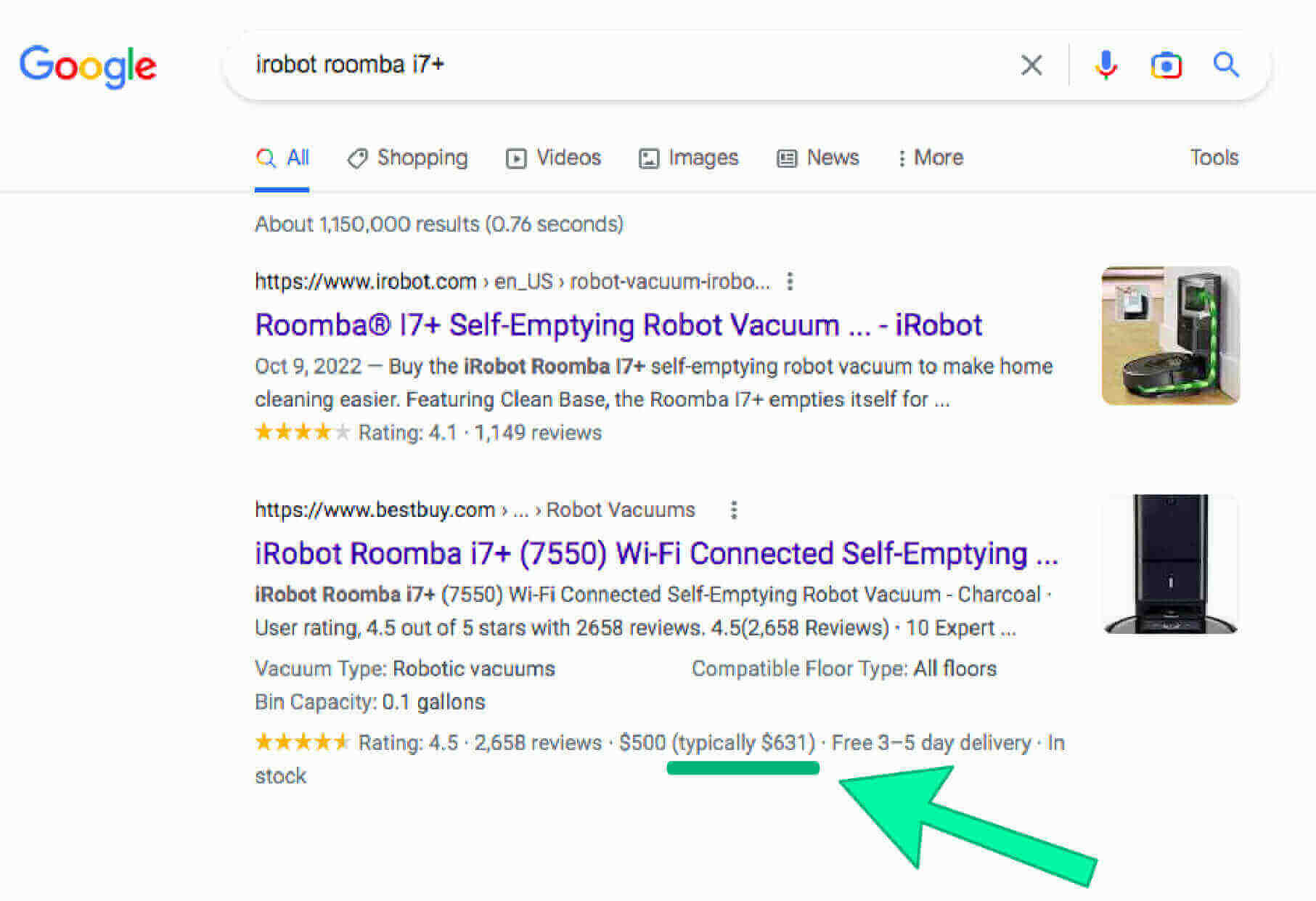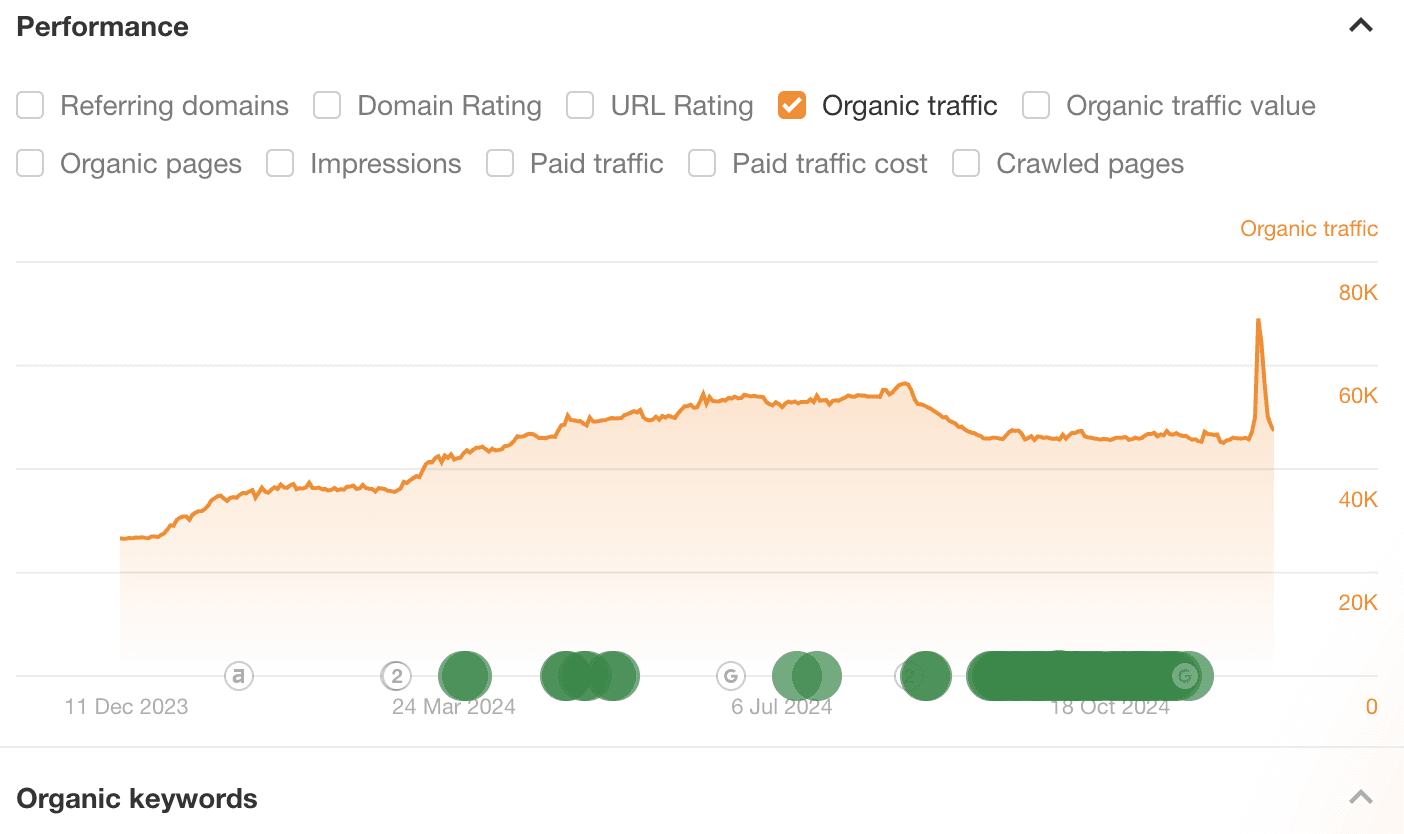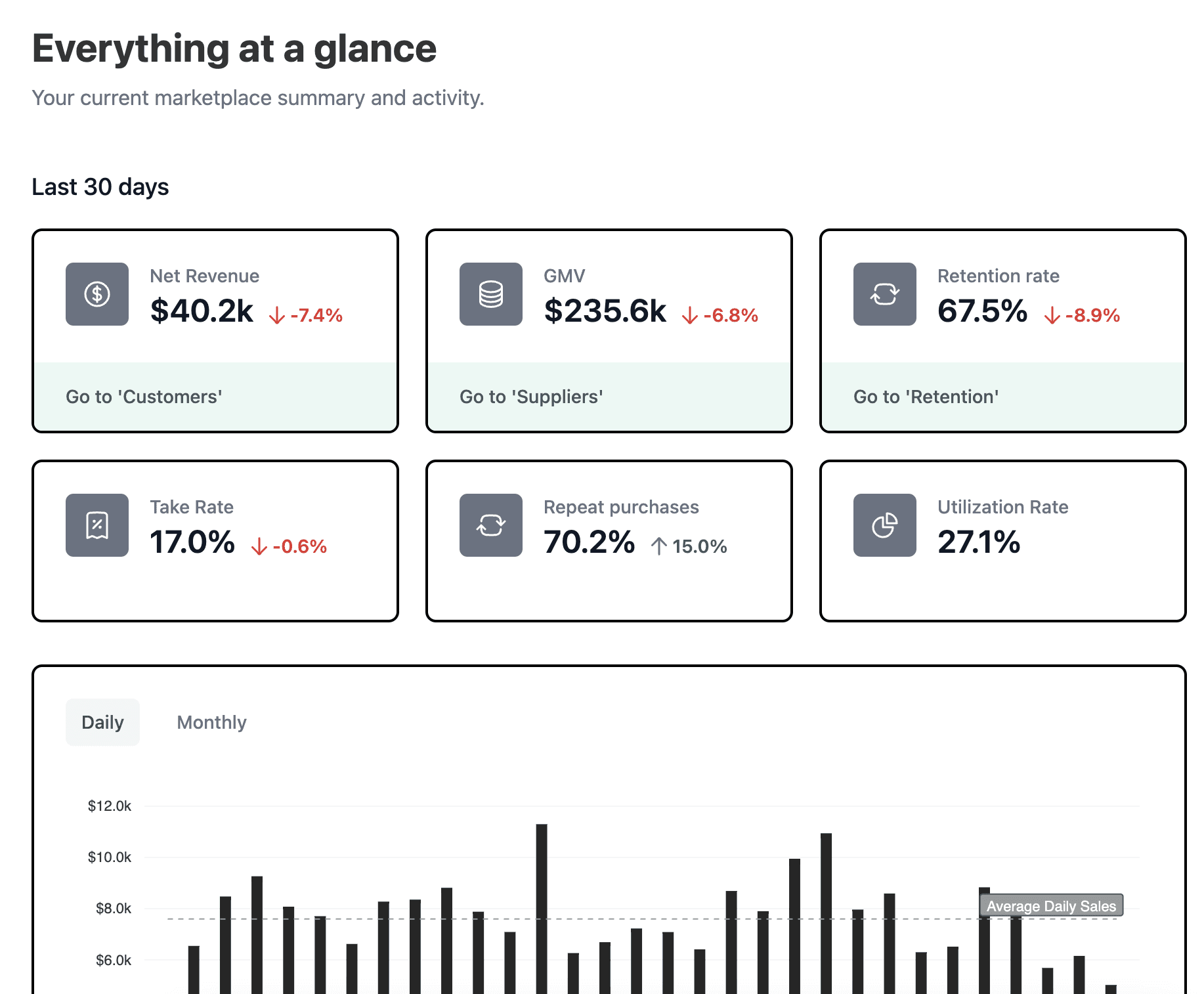SEO is the magic key that many startups want to conquer. It provides a steady flow of highly relevant traffic, and can in many cases be the difference between success and failure.
While this can be tricky for many businesses, marketplaces in particular are a great fit to climb up the SEO ladder. That’s because:
- Scale: Marketplaces typically generate a massive amount of pages automatically.
- Intent: They sell services and products that customers are actively searching for.
- UGC: They can leverage their suppliers to write content for them (listings, profiles, reviews).
- Network Effects: Suppliers often share their own profiles, generating backlinks.
In this comprehensive guide, we’ll take a look at five low-hanging fruits that marketplace startups can pick to quickstart their SEO engine, moving beyond basic tips into actionable strategies.
1. Optimize User-Generated Content (Programmatic SEO)
Typically, a marketplace creates a lot of user-generated content (UGC). Be it product listings, supplier pages, search results or popular questions about products – all can be leveraged to grow the SEO footprint of a marketplace.
However, users are often bad at SEO. They might title their listing “My couch” instead of “Vintage leather couch in Berlin”.
Your job is to act as the editor-in-chief. You can programmatically rewrite titles and meta descriptions to match search intent.
The Strategy: Template Injection
For one of our clients, simply changing the <title> tag of product pages from:
Used Pallet
to:
Buy 48 x 40 Used Pallet in Chino, California | [Marketplace Name]
improved organic search impressions and clicks from search engines drastically (300% increase in two weeks).
Actionable Tip:
Use a template for your title tags: [Product Name] in [City] - Buy/Rent at [Price] | [Brand Name].
For meta descriptions: Looking for [Product Name] in [City]? Find the best deals on [Brand Name] starting at [Price]. Verified sellers. Fast shipping.
Keeping Listings “Alive”
Another low-hanging optimization is handling expired listings. When a product sells, don’t 404 the page immediately. That destroys the SEO value it built up. Instead:
- Mark the item as “Sold”.
- Show “Similar Items” prominently.
- Keep the page live for a few months to harvest the traffic, then 301 redirect it to the parent category.
Schema Markup
Wrap your listings in Schema.org structured data (Product, AggregateRating). This allows Google to show price, availability, and star ratings directly in the search results (Rich Snippets), drastically increasing your Click-Through Rate (CTR).

2. Categorize Your Offerings (Faceted Navigation)
The second thing to leverage is your marketplace’s search. Most marketplaces offer some way of filtering their offerings (Color, Size, Brand, Location). It’s a crucial part of the customer experience.
However, most marketplaces sleep on categorizing their offerings so that search engines can also leverage their SEO inputs to provide narrower results.
If a user filters for “Red Nike Shoes”, your URL might look like ?brand=nike&color=red. Search engines often ignore these dynamic parameters because they look like temporary search results.
The Strategy: Static Category Pages
Turn popular filter combinations into static, indexable subpages.
In one of our experiments, a used airplane marketplace went from only using the search engine to categorizing the airplanes by brand on their own little subpage, such as /brand/cessna/.
Result: By leveraging this, more than 40 new subpages got picked up by Google, eventually providing an influx of over 10,000 new organic clicks per month.
Warning: Spider Traps Be careful not to create a static page for every possible combination (e.g., “Red Nike Shoes Size 10.5 with White Laces”). This creates millions of “thin content” pages that waste Google’s crawl budget. Only index the categories that have significant search volume.
3. Leverage Local SEO
In the same realm as our last tip, leveraging local SEO is a must-do. Even if a marketplace – such as an online service provider – does not have a local aspect, providing local subpages can help Google connect marketplaces quicker with new local customers.
Strategy: Create a directory structure for locations:
/usa/california/san-francisco/web-designers/germany/berlin/plumbers
Populate these pages with the relevant listings for that area.
The Duplicate Content Myth: Founders worry that these pages look the same. To avoid “duplicate content” penalties, add some unique text about the service in that city (e.g., “Find top-rated plumbers in Berlin. Average price: €50/hr…”).

4. Expand on Internal Linking
One of the biggest challenges for marketplaces is that they have too many pages. Google’s crawler might not find that obscure listing on page 50.
Strategy: Build a Spiderweb
- “Related Products”: On every listing page, show “Similar items”. This links products to each other horizontally.
- “Breadcrumbs”: Implement breadcrumbs (Home > Shoes > Nike > Red) to link back up to category pages.
- “Popular Searches”: Add a footer section with links to your most popular categories (e.g., “Popular in New York”, “Popular Brands”).
This helps link equity (PageRank) flow from your homepage down to your specific product pages, helping them rank.
5. Expand Content with “Supply-Side” Guides
In the next step, the magic word is expansion. Many marketplaces will already see tremendous results in leveraging what they already have. If that’s not enough, targeted expansion is the next step.
This can be as simple as creating additional categories, or as far as collecting new data.
One of our clients, MentorCruise, leveraged their in-house data of coaches and knowledge, expanded with a handpicked resource collection to create end-to-end “Career Tracks” and learning guides.
Why it works:
- It targets “top of funnel” traffic (people looking for advice, not just a mentor yet).
- It establishes authority.
- It serves as a lead magnet. A user reads “How to become a Data Scientist”, and the sidebar shows “Hire a Data Science Mentor”.

Expanding in-house data for SEO is by far the most expensive and time-consuming way of growing a marketplace’s SEO footprint covered in this guide. However, it can help break existing boundaries by finding new niches and keyword clusters to explore.
6. Image Optimization at Scale
Marketplaces are visual. Airbnb, Etsy, Turo – they all rely on high-quality images. But search engines can’t “see” images; they read them.
The Problem:
Users upload images with filenames like IMG_9823.jpg. This tells Google nothing.
The Solution: Programmatically rename images and add Alt Text based on the listing data.
- Filename:
vintage-leather-couch-berlin-1.jpg - Alt Text: “Front view of a vintage brown leather couch available for pickup in Berlin.”
This allows your images to rank in Google Images, which can be a massive driver of traffic for visual categories (fashion, decor, real estate).
Additionally, serve images in next-gen formats like WebP and lazy-load them. Fast-loading pages rank higher, and marketplaces are notoriously heavy on page weight.
Speed and Core Web Vitals
Speaking of images, page speed is a ranking factor. Marketplaces are heavy. You have maps, chats, booking widgets, and carousels.
Optimization Checklist:
- Lazy Load Everything: Don’t load the map until the user scrolls to it.
- CDN: Use a Content Delivery Network (Cloudflare/AWS CloudFront) to serve assets from a server near the user.
- Virtualization: If you are rendering a list of 1,000 items, only render the 10 visible on screen (Windowing).
7. Managing UGC Spam
When you open your gates to UGC for SEO, you also open them to spammers. Spammers love marketplaces. They will create profiles just to link back to their gambling or pharma sites.
The Risk: If Google sees your site linking to thousands of spammy domains, they will penalize you.
The Defense:
- rel=“nofollow”: Add
rel="nofollow"to all user-generated links by default. - Moderation Queue: New accounts shouldn’t be indexable until they pass a verification check or have been active for X days.
- Text Analysis: Block profiles containing known spam keywords.
8. Leveraging Internal Search Data
Your own site search is a goldmine for SEO. It tells you exactly what users want that you might not be providing.
Strategy: Look at your “Zero Results” searches.
- If 500 people search for “Drone Repair” and you have no category for it, create it.
- Even if you have no suppliers yet, create a “Waitlist” page. It captures the demand and the SEO traffic, which you can then use to recruit suppliers (“Hey, I have 500 people looking for drone repair, want to join?“).
9. Audit Every Month
Last, but not least, it’s important to stay on top of SEO. Organic traffic from search engines ebbs and flows, and new Google updates can lead to marketplaces losing (or sometimes, surprisingly gaining) spots in the battle for #1.
Not only that, but competitors won’t wait around for long due to the transparent nature of SEO. Staying on top of new changes and keeping quality high is key to longevity in SEO.

We recommend our clients and friends to audit their SEO result once per month. The easiest ways to do so is to sign up for Google Search Console, or to leverage more extensive analytics such as ahrefs or twosided.
Look for:
- New 404 errors: Did a big category get deleted?
- Declining CTR: Do you need to rewrite titles?
- New Keywords: Is your site ranking for terms you didn’t expect? Build a page for them!
Leveraging analytics makes sure that any dips in traffic or revenue are easily explained, and hopefully caught early. It also helps to expose new opportunities in SEO that could lead to new pages, categories or locations being interesting for a SEO use case.

How Twosided Can Turbocharge Your SEO
SEO for marketplaces isn’t just about keywords; it’s about technical performance and user behavior. If users bounce because your site is slow or irrelevant, your rankings drop.
Twosided provides the insights you need to connect SEO traffic to actual revenue:
- Revenue Attribution: Don’t just track clicks. See which landing pages actually drive GMV.
- Search Performance: Analyze internal search data to find “zero result” queries – these are perfect candidates for new SEO pages.
- User Journeys: Understand how users navigate from a blog post to a booking.
Stop guessing which pages make money. Audit your marketplace SEO with Twosided.
